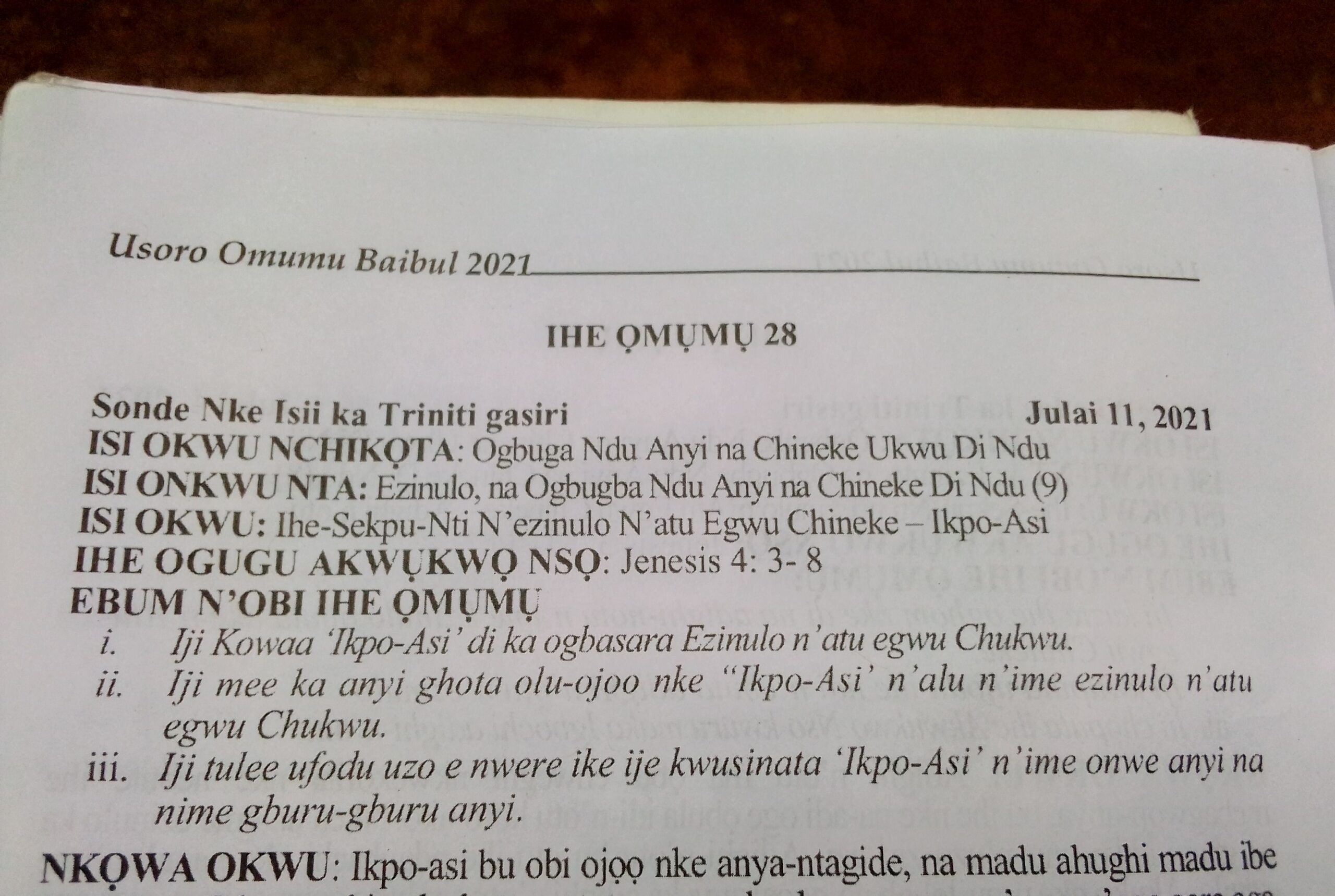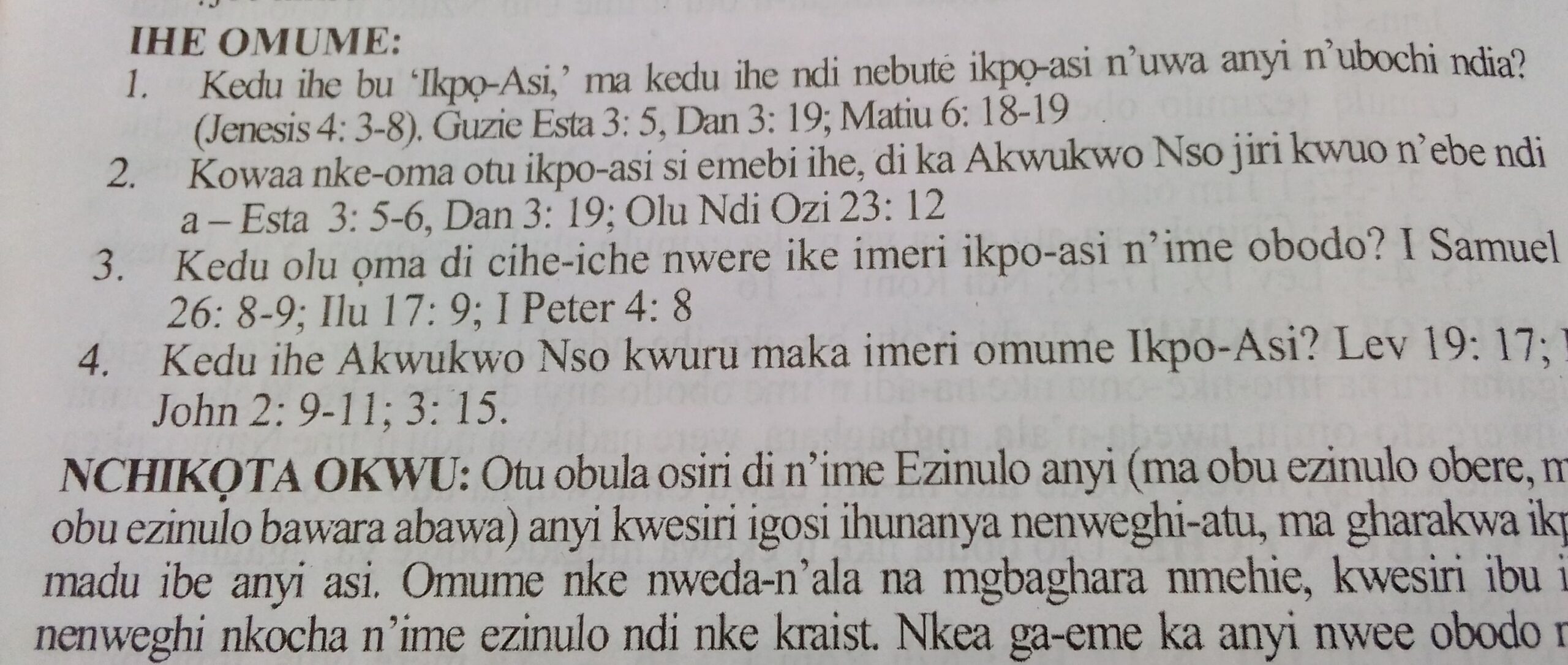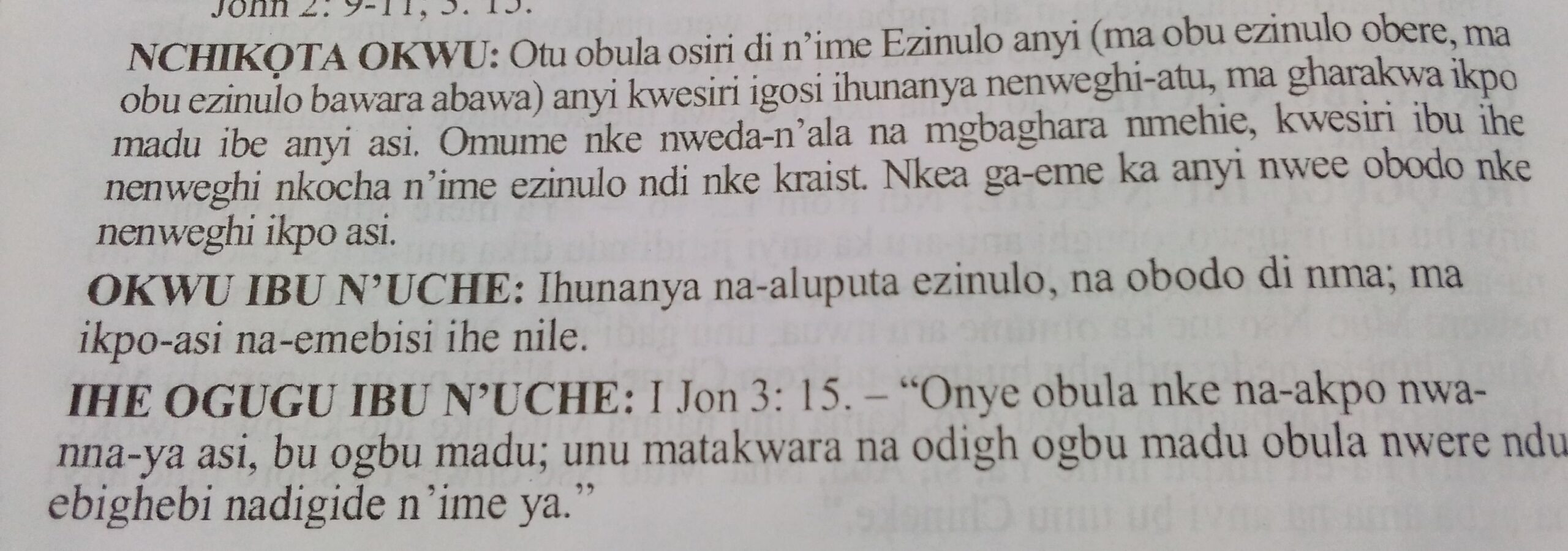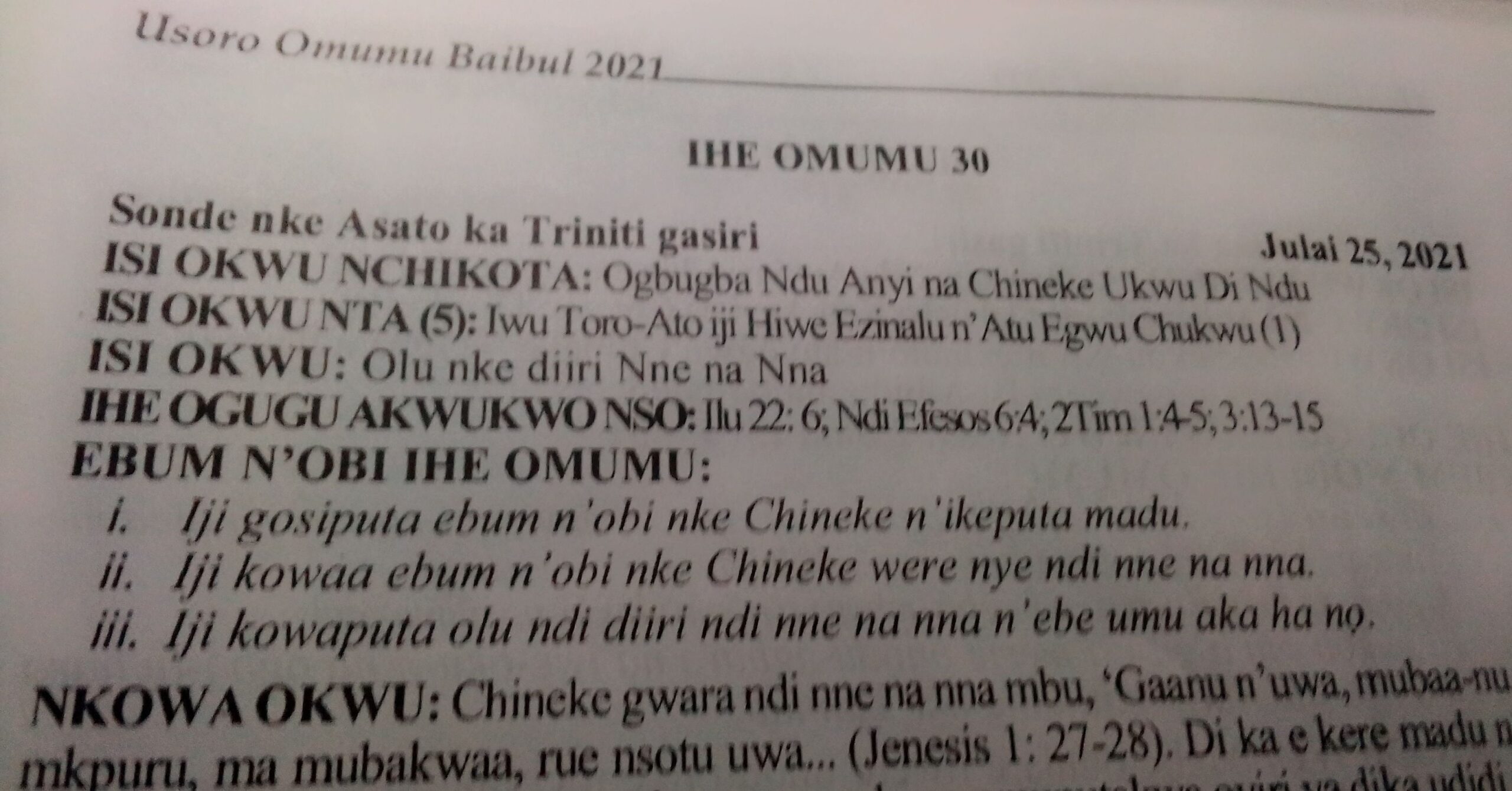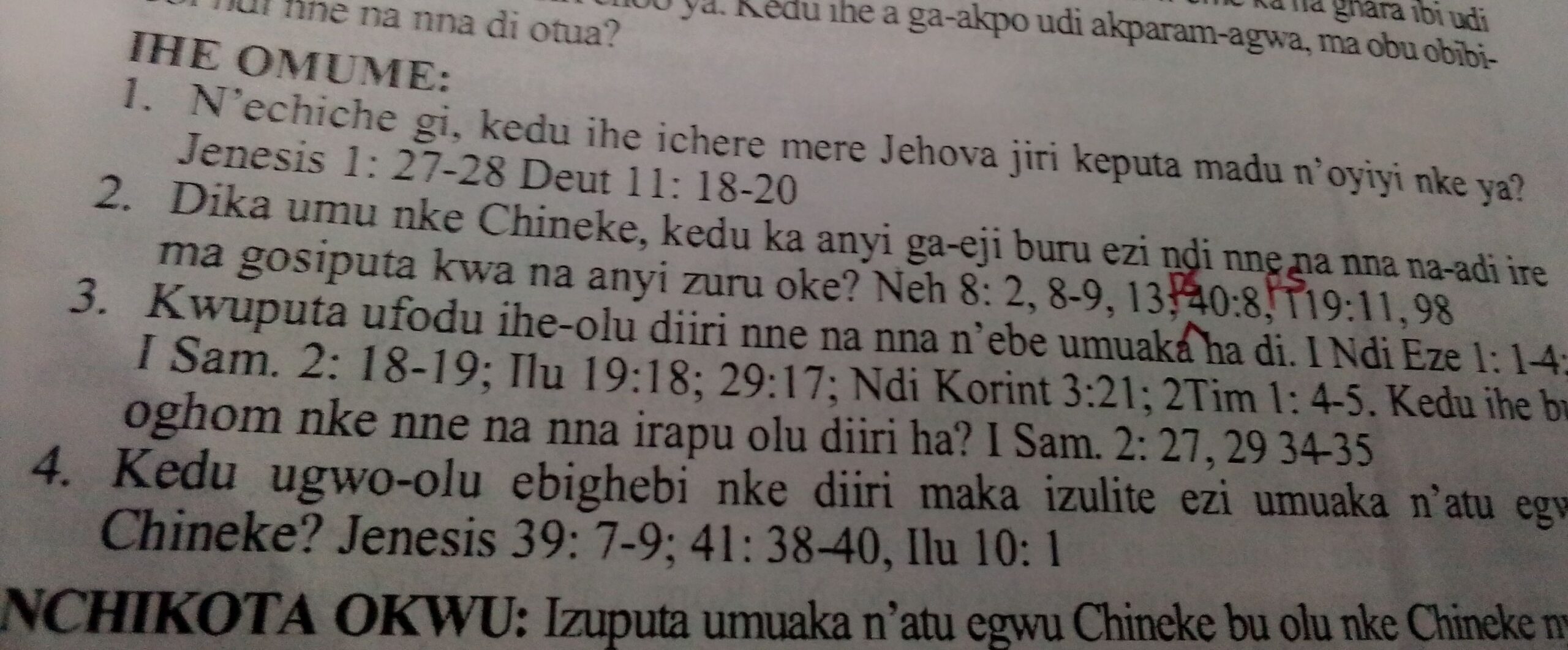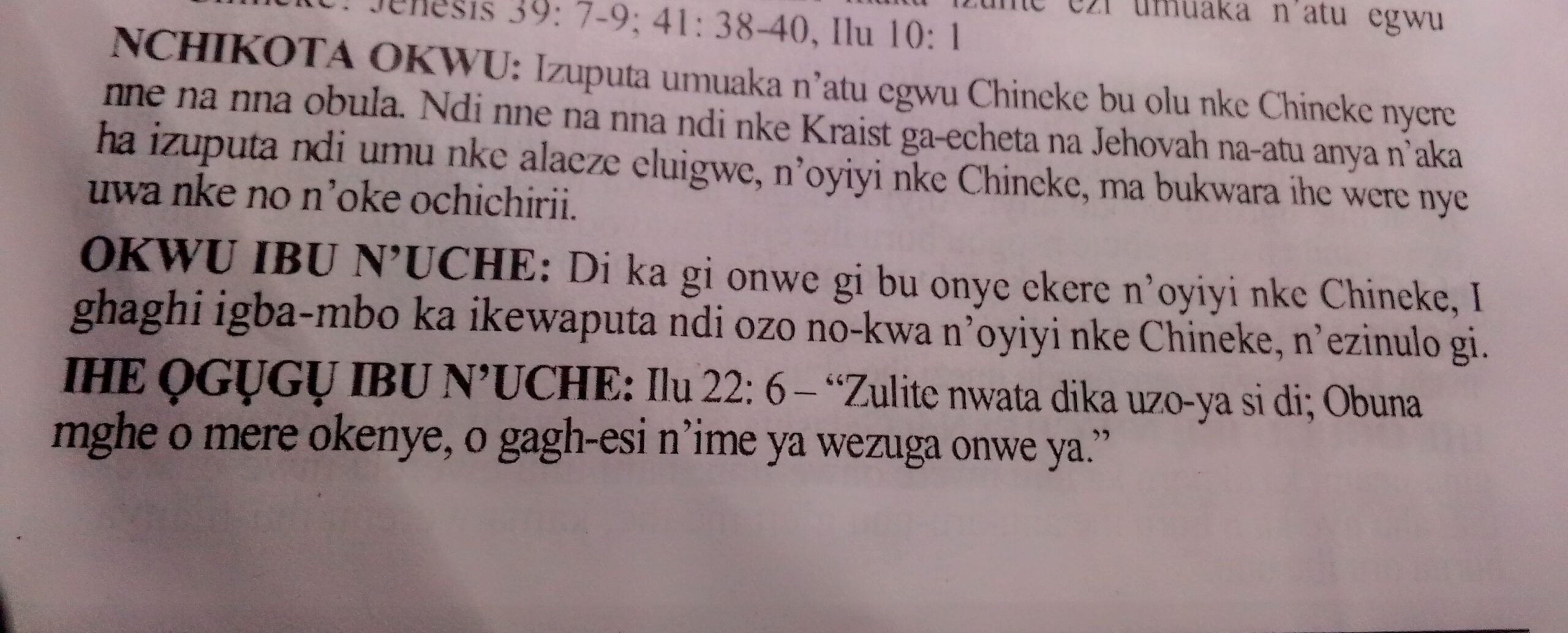Search Contents
2021 Anglican Bible Study Outline (Continuation)
This is a continuation of the 2021 Anglican bible study outline for the Church of Nigeria, Anglican communion. Keep studying from here or install the complete version from the play store.
STUDY 23
1st Sunday after Trinity June 6, 2021
THEME: COVENANT WITH THE LIVING GOD
SUB THEME: Family and Covenant with the Living God
TOPIC: Essential of godly family – Love
TEXT: Rom. 12:9 – 21
AIMS: i. to teach true love in the formation of a godly family and
ii. to show the importance of love and how it can be practiced in an ideal family.
INTRODUCTION: Love is a complex set of emotions, behaviours, and beliefs associated with qualities of affection, protectiveness, warmth and respect for another person. Love has gained much importance in the unity and cohesion of people of diverse ethnic, cultural and religious backgrounds. The text of Romans 12: 9ff gives features which love is made of. It shows love in action and not an abstract idea. Let us go through the study guides for these features.
STUDY GUIDE:
1. In your own words, define the word “LOVE” in relation to family life?
2. What features of Love for a godly family are stated in the text (Rom. 12:9 – 21 )and in the following passages? 1 Cor. 13:1-8; Heb. 13:1; Phil. 1:8-11
3. Despite the fact that marriages are constituted in love, there has been a collapse of many. Why? 2 Sam. 13:1,10-15; Romans 12: 9 ; 1John 4: 18.
4. You can give without loving but you cannot love without giving. How true is this statement? John 3:16; Rom. 5:1-8; 1 John 3:16-18 ref 1Cor 13:1-4.
CONCLUSION: Christian families build the Church (family). Therefore, love in Christian families must be sincere and unfeigned. It must not be by only words or professions but should be expressed through acts of kindness and deeds of charity.
FOOD FOR THOUGHT: Families without Love make a wicked society.
MEMORY VERSE – 1 John 4:7“Beloved, let us love one another, for love is of God; and everyone who loves is born of God and knows God.
Why not install the Bible Study App on your phone? Follow the link below to install; it is free.
2021 Anglican Bible Study Outline App.
CLICK TO INSTALL ON YOUR PHONE
Bible study Igbo Version
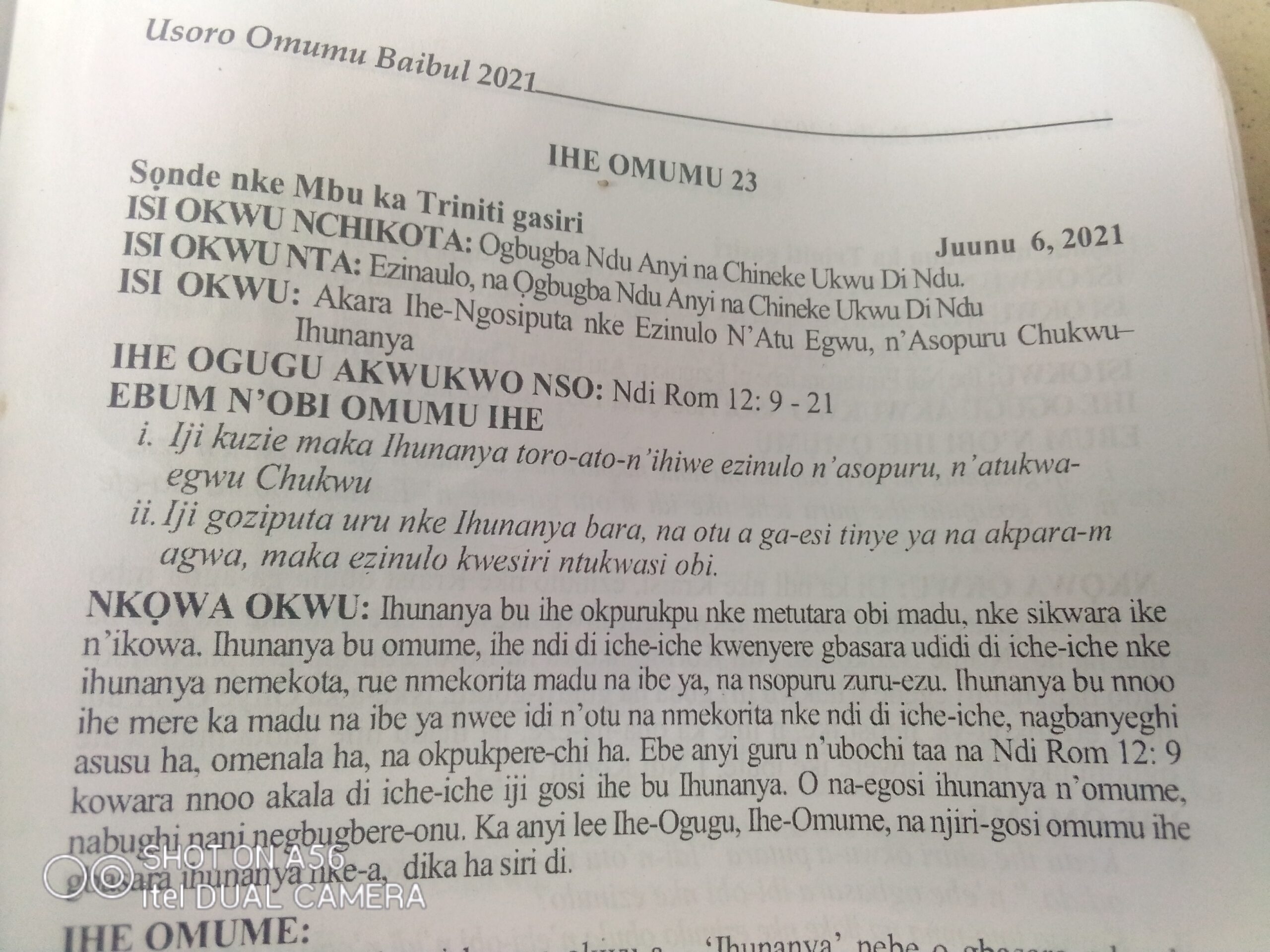
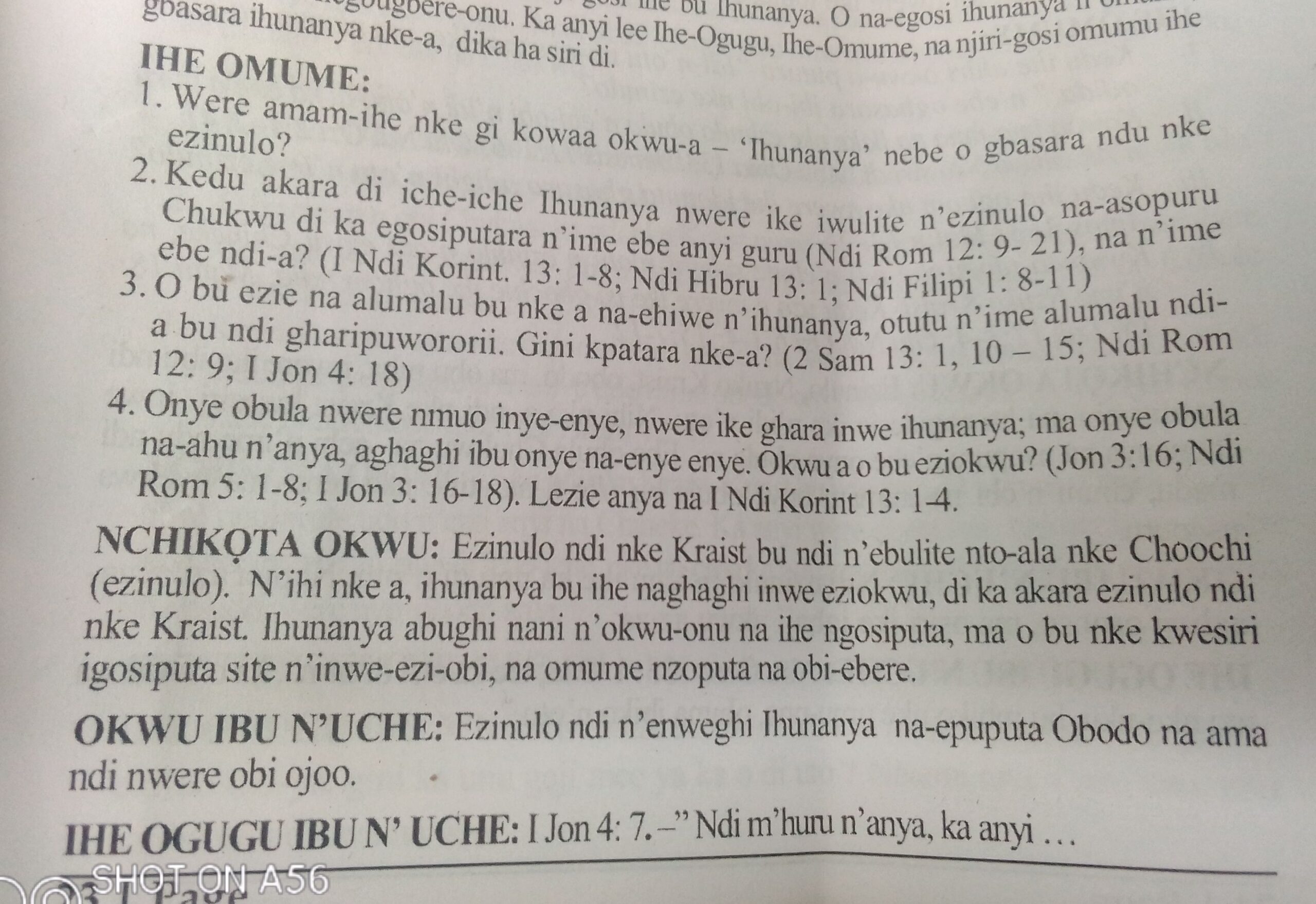
STUDY 24
2nd Sunday after Trinity June 13, 2021
THEME: COVENANT WITH THE LIVING GOD
SUB THEME: The Essential of godly family – Unity
TEXT: Psalm 133; 1 Cor. 1:10 – 17
AIMS: i. to know that unity is one of the fruits of a godly family
ii. to see the effect of unity in a godly family
INTRODUCTION: The Christian family as a part of the Church should not allow division in itself. There should be no division between children and parents. In the Corinthian Church, factions became the ‘little foxes’ that destroyed the hedge around it. Apostle Paul was quick to address the situation, having great regard for the havoc factions can cause – 1 Cor. 1:13.
STUDY GUIDE:
1. What does this sentence mean “united we stand, divided we fall” with reference to family life?
2. Explain the beauty and strength of a united family according to these passages: Psalm 133; Gen. 11:1 – 6; Acts 2: 1-2, 41
3. What are the dangers of disunity in a family? Amos 3:3; Matt. 12:25.
4. Mention some causes of disunity in a godly family and in the Church of God and possible ways to tackle it. Matt. 18:15; Lk 17:3-4; Acts 6:1-4; 15:7,12
CONCLUSION: A family, church, community, or nation can only achieve greatness in the atmosphere of unity. Therefore, Christians should love and respect others’ opinions because, where God rules, every family members’ opinion is welcomed and respected.
FOOD FOR THOUGHT: Families, be united! A broomstick breaks more easily, whereas a bunch of brooms is harder to break.
MEMORY VERSE: Psalm 133:1 “Behold, how good and how pleasant it is for brethren to dwell together in unity!”
2021 Anglican Bible Study Outline
STUDY 25
3rd Sunday after Trinity June 20, 2021
THEME: COVENANT WITH THE LIVING GOD
SUB-THEME: Family and Covenant with the Living God (6)
TOPIC: The Essential of godly Family- Peace
TEXT: Psalm 34:11-15; Mark 9:50; Titus 1:6-9, AIMS: i. to explain the concept of peace ii. to teach those virtues expected from a peaceful Christian family and iii. to analyze how a peaceful family can transit into a peaceful society
INTRODUCTION: Peace can be defined as a state of security or order within a community provided for by law or custom. Peace can summarily be said to be freedom from civil disturbance. It is in God’s plan that we have a godly family filled with the peace of God so much that we can pass this to other families resulting in the birth of a peaceful society (Mark 9:50). What then are the virtues that characterize a peaceful and godly family?
STUDY GUIDE:
1. Simply define peace in the context of Tit 1:6-9 and identify the value placed on the father, as head of the family.
2. It is the plan of God that Christians have or raise godly and peaceful families. Why is there no peace in some families today? Gen 25:27-28; 1Timothy 5:8
3. Explain the value placed on godly family in Mk 9:50 and how a godly family can impact peace on society? 2Co 13:11; Eph. 4:29; Col 4:6; Heb. 12:14.
CONCLUSION: As Christians, Christ is our peace and He has reconciled us together with His blood, let us, therefore, pursue all that will bring peace in our individual lives so that our lives in families can transit into a tranquil society.
FOOD FOR THOUGHT: Peaceful families make a peaceful society.
MEMORY VERSE: Mark 9:50 “Salt is good, but if the salt loses its flavor, how will you season it? Have salt in yourselves and have peace with one another.”
IGBO VERSION IHE ỌMỤMỤ 25
Juunu 20, 2021. (Sonde nke Ato ka Triniiti gasiri).
ISI OKWU NCHỊKỌTA: Ọgbụgba Ndụ Anyị na Chineke Ukwu Di Ndu
ISI OKWU NTA: Ezinulo, na Ọgbụgba Ndụ Anyị na Chineke Ukwu Di Ndu(6).
ISI OKWU: Ihe Ndi Pụwagara iche N’ezinulo n’Atu Egwu Chukwu – Udo
IHE OGUGU AKWUKWO NSO: Abu Ọma 34: 11 – 15, Mak 9: 50; Titus 1: 6 – 9
EBUM N’OBI IHE ỌMỤMỤ:
i. Iji kowaa Isi-okwu a bu ‘Udo’.
ii. Iji kuzie akara ezi-ndu ndi ahu a turu anay, n’ebe Ezinulo ndi nke Kraist, nke nebi n’udo di.
iii. Iji hazie ka ezinulo dị n’udo ga-esi luputa obodo n’ebi n’udo.
NKỌWA OKWU: A na-akowa ‘Udo’ di ka mgbe e nwere ezi-nchekwaba na usoro n’ime obodo, nke o bu iwu na ezi-nchịkota nebute. E nwekwara ike kọwaa ‘udo’ dị ka inwere onwe site na nsogbu dị iche iche. Ọ bụ ebum-n’obi Chineke na anyị ga-enwe ezinulo n’atụ egwu Chukwu, nke nwekwara udo nke Chukwu na-enye. Nke a bu ihe ezinulo nwekara ike inyefe ezinulo ndị ọzo, si otua rue na obodo niile, nke ga-eme ka anyi nwee udo nke obodo. (Mak 9: 50). Kedu ndụ ọma nke neegosiputa ezinulo di n’udo, na ezinulo na-ebi obi na Chukwu?
IHE OMUME:
- Kọwaa ‘Udo’ dike esiri kwue maka ya n’ime Titus 1: 6 – 9, ma gosiputa olu nke diiri Nna, dika onye ndum nke ezinulo.
- Ọ bụ ebumnobi Chukwu ka ndi Kraist nwee ma zuputakwa ezinulo nke nadabere na Chukwu, ma nebikwa Obi n’udo. Kedu ihe mere na udo adighi n’ufodu ezinulo n’ubochi ndi a? Jenesis 25: 27 – 28; 1 Timothy 5: 8.
- Kowaa uru ezi-ndu nke putara ihe dika o di na Mak 9: 50, ma kwue ka ezinulo n’adị n’udo ga-esi gosiputa ma nye udo n’ime obodo anyị. II Ndi Korint 13: 11, Ndi Efesos 4: 29; Ndi Kolosi 4: 6; Ndi Hibru 12: 14
NCHỊKOTA OKWU: Dịka ndi nke Kraist, Kraist bu udo anyi. O werewo Obara Ya were tinye nnukwute udo n’etiti anyi na Chineke. Ka anyị were egwu soro ụzọ o bula ga-ebutere anyi udo n’ezinulo anyo di iche iche, nke ga-eme ka ndụ anyi n’ime Ezinulo buru nke ga-ebute inwe-udo, were nye obodo anyi.
OKWU IBU N’UCHE: Ndị Ezinulo n’ebi n’udo, na-eme ka obodo diri n’udo.
IHE ỌGỤGỤ IBU N’UCHE: Mak 9: 50 – “Nnu dị nma, ma o buru na nnu etufue ụto ya, gini ka unu ga-eji mee ya ka o di ụto? Nweenu nnu n’ime unu, unu na ibe unu dikwa n’udo”.
2021 Anglican Bible Study Outline
STUDY 26
4th Sunday after Trinity June 27, 2021
THEME: COVENANT WITH THE LIVING GOD.
SUB-THEME: Family and Covenant with the living God (6)
TOPIC: The Essential of Godly Family- Joy
TEXT: Gen. 21:6, 24: 67; John 15: 11-17
AIMS:
i. to understand the concept of Joy in a family
ii. to teach the conditions for a joyful and godly family
INTRODUCTION: Joy is a feeling of great pleasure and happiness or felicity that is evoked by well-being, success, or good fortune or by the prospect of possessing what one desires. Spiritually, it is the inner deep gladness that one has regardless of prevailing circumstances around one’s life. The texts reveal some of the sources of human joy and happiness. However, Christ has taught and shown us the basis for the fullness of physical and spiritual joy. We shall study this today.
STUDY GUIDE:
1. Explain the concept of Joy with regard to family life. Genesis 21: 6, 24: 67; – Compare 1sam 1: 5-7
2. What is the basis for heavenly joy with reference to Zeph. 3:15-17; Luke 15: 6-7?
3. What are the conditions of Joy in a godly family? Psalm 113: 9; 127: 3; Isaiah 8: 18; Prov 31: 10-11; 1 Pet 3: 7.
4. How can Joy be sustained in a family? Psalm 16: 11, 71:23.
CONCLUSION: Only the King of kings who rules over heavens where there is no sorrow but everlasting joy; can give unconditional joy. Therefore, let us continuously allow Him lead us so we may have joy both in this world and in heaven.
FOOD FOR THOUGHT: Heavens rejoice when they see forgiven sinners in Jesus Christ.
MEMORY VERSE: Psalm 16:11 “Thou wilt shew me the path of life: in thy presence is fullness of joy; at thy right hand there are pleasures for evermore”.
IHE ỌMỤMỤ 26
Juunu 27, 2021. (Sonde nke Ano ka Triniiti Gasiri).
ISI OKWU NCHỊKỌTA: Ọgbụgba Ndụ Anyị na Chineke Ukwu Di Ndu
ISI OKWU NTA: Ezinulo, na Ọgbụgba Ndụ Anyị na Chineke Ukwu Di Ndu (7).
ISI OKWU: Ihe Ndi Pụwagara iche N’ezinulo n’Atu Egwu Chukwu – Ọṅụ
IHE OGUGU AKWUKWO NSO: Genesis 21: 6, 24: 67; John 5: 11 – 17.
EBUM N’OBI IHE ỌMỤMỤ:
- Iji ghota Isi-okwu a bu ‘Ọṅu’ n’ime ezinulo
- Iji kuzie usoro oma na-ebute ọṅu n’ime ezinulo na-atu egwu Chineke.
NKỌWA OKWU: Ọṅụ bu ihe nziputa nke na-egosi ngoli na obi uto nke naani ihe na-akpali ya bu: idi-nma, agamniru, ma o bu iru oma ma o bukwanu mmadu ituanya na ihe nweta di n’iru. Nke a bu nke na-eme ka mmadu nwezue ihe o choro. N’ime nke ihe nmuo, o bu ọṅụ nke sitere n’ ala ala obi nke mmadụ nenwe n’agbanyeghi ihe ndaputa di iche iche na-adakwasi onye ahu. Ebe anyi guru, na-egosiputa ufodi usoro di iche iche mmadu ji e nwe ọṅu na obi ụto. Ma nke kasi bun a Kraist e gosiwoorii anyi ntoala nke nmezu nke oṅu nke a na-ahu anya, na oṅu nke ime nmuo. Nke a ka anyi ga-atule n’ubochi taa.
IHE OMUME:
- Kọwaa isiokwu nke bu ‘Ọṅụ’ n’ebe o gbasaara ibi obi ndi nke Kraist. Genesis 21: 6, 24: 67;. Site n’ebe ndi a, tulee 1Sam 1: 5 – 7.
- Kedu ebe ọṅu eluigwe jiri puta ihe, dika na Zeph 3: 15 – 17; Luke 15: 6 – 7?
- Kedu ihe ndi ga-egosiputa ‘ọṅu’ n’ime ezinulo ntoala Chineke? Abuoma 113: 9; 127: 3; Isaiah 8: 18; Prov. 31: 10 – 11; 1 Peter 3: 7.
- Kedu ka a ga-esi mee ka ọṅụ buru ihe na- adigide n’ezinulo? Psalm 16: 11, 71:23.
NCHỊKOTA OKWU: Naani Eze nke ndi eze, nke na-achi uwa niile na eluigwe, ebe a na-enweghi iru ụjụ, kama naani ọṅụ ebigheghi, nwere ike inye ọṅụ nke nenweghi mgbakwunye. Ya mere, ka anyi, n’eleghi anya n;azụ, kwee ka Ọ buru onye ndu anyi, ka anyi were nwee ọṅụ n’ime ụwa nke a, ma na uwa nke na-abia abia, bu eluigwe.
OKWU IBU N’UCHE: Eluigwe na-aṅuri ọṅu mgbe ha huru ndi mmehie cheghariri echeghari, ndi agbaghaworo mmehie ha na-ebi ndu n’ime Jisos Kraist.
IHE ỌGỤGỤ IBU N’UCHE: Abuoma 16: 11 – “I ga-eme ka m mara ụzo ndụ: o juju afo ọṅụ di niru Gị; E! uto di iche iche di n’aka nri Gi, rue ebighebe.”
2021 Anglican Bible Study Outline
STUDY 27
5th Sunday after Trinity July 4, 2021
THEME: COVENANT WITH THE LIVING GOD.
SUB THEME: Family and covenant with the living God (8)
TOPIC: The Bane of godly family—Disunity
TEXT: Gen 37:1-11
AIMS: i. to teach the dangers of disunity in a godly family,
ii. to highlight some factors that cause disunity in the family and
iii. to Identify biblical ways to prevent disunity.
INTRODUCTION: There is great distress or frustration when disunity or lack of agreement among any people prevents them from working or living together effectively. Disunity is one of the major reasons for the setback of the human family. Going through the story of the children of Jacob, we observe that disunity eventually caused chaos, hatred, and bitter jealousy. God wants us to be united (1Cor. 1:10). What are the causes of disunity in a godly family?
STUDY GUIDES
1. What is disunity and mention some factors of disunity in a godly family. Gen 21: 9-14; 37: 3 – 4;
2. Mention some contemporary causes of disunity in the church of Christ. Jam 4: 1;
3. Practically discuss how disunity is threatening the peace of many families (nuclear or extended) today and how this can be avoided? Genesis 13: 7-12; Gal. 5: 16; Ephesians 4: 31-32; 1Tim 6: 6.
4. What does God expect of all godly families? Gen 45: 4-5; Leviticus 19:17-18; Romans 12:16.
CONCLUSION: Disunity is the bane of effective and successful social co-existence. When we have contentment, humility, forgiveness and we live by the Spirit, then we can produce both godly families and a peaceful world.
FOOD FOR THOUGHT: A house divided against itself cannot stand.
MEMORY VERSE: Rom 12:16 “Be of the same mind one toward another. Mind not high things but condescend to men of low estate. Be not wise in your own conceits”.
2021 Anglican Bible Study Outline
IHE ỌMỤMỤ 27
July 4, 2021. (Sonde nke Ise ka Triniiti Gasiri).
ISI OKWU NCHỊKỌTA: Ọgbụgba Ndụ Anyị na Chineke Ukwu Di Ndu
ISI OKWU NTA: Ezinulo, na Ọgbụgba Ndụ Anyị na Chineke Ukwu Di Ndu (8).
ISI OKWU: Ihe Sekpu Nti N’ezinulo n’Atu Egwu Chukwu – Adighi n’otu
IHE OGUGU AKWUKWO NSO: Gen 37: 1-11
EBUM N’OBI IHE ỌMỤMỤ:
i. Iji kuzie ihe oghom nke di na adighi n’otu n’ime ezinulo o bula nke na-atu egwu Chineke.
ii. Iji kwuputa ufodu ihe ndi na-ebute adighi n’otu.
iii. Iji choputa ihe Akwukwo Nso kwuru maka igbochi adighi n’otu.
NKỌWA OKWU:
A dighi n’otu ma o bu enweghi nkwekorita nke na-ebute ihe mgbagwoju anya, bu ihe nke na-adi oge o bula idi n’otu kọrọ ụkọ. Nke a na-eme ezinulo ka ha ghara idiko onu n’uzo ziri ezi. Adighi n’otu bu otu bu otu ihe ndaghachi nke na-adi n’ime ezinulo. Akuku nke umu Jacob na-egosi anyi ka adighi n’otu siri bute Ogbaghara, ekworo, akpomasi, na Obiilu, n’ajo ihe ndi ozo di iche iche. Chineke choro ka anyi noro n’idi n’otu (1 Cor. 1: 10). Kedu ihe ndi na-ebute adighi n’otu n’ime ezinulo na-atu egwu chineke?
IHE OMUME:
- Kedu ihe bu ‘Adighi n’out’? Kedu ufodu ihe na-egosi adighi n’otu n’ezinulo ndi Kraist? Gen. 21: 9 – 14; 37: 3 – 4.
- Kwuputa ufodi ihe ndi na-ebute adighi n’otu n’ime ulo nzuko n’ubochi ndi a James 4: 1?
- Kọọ akuko ma tuleekwaa ka adighi n’otu jiri ebute mgbasa nke udo nke otutu ezinulo (Ezinulo obere na Ezinulo bara uba). Kedu ka a aga-eji gbochie di otu a n’ubochi ndi a Gen. 13: 7 – 12; Galatians 5: 16; Ephesians 4: 31 – 32; 1 Tom 6: 6?
- Kedu ihe Chineke na-atu anya ya n’aka ezinulo o bula na-asopuru Ya? Gen. 45: 4- 5; Levit 19: 17 – 18; Roms 12: 16.
NCHỊKOTA OKWU: Adighi n’out bu oke ihe ndachi nke nwere ike imegide agamniru na ime nke oma nke na-adi n;ime obodo any di iche iche. Mgbe o bula e nwere afo ojuju, mnweda ala, mgbaghara, were nadikwa ndu n’ime Nmuo, nke a ga-eme ka anyi nwete obodo na-atu egwu Chineke, na tọrọ atọ.
OKWU IBU N’UCHE: Ụlọ o bula nke na-ekewa megide onwe ya, a gaghi egozusike.
IHE ỌGỤGỤ IBU N’UCHE: Roms 12: 16 – “Ya mere o tua, Umunna m, anyi bu ndi ji ugwo, obughi anu aru ka anyi ji, idi ndi dika anu aru so choo, n’ihi asi na unu na-adi ndu dika anu aru si choo, unu gaje; ma o buru na unu nwere nmuo Nso mee ka omume aru nwua, unu ga-adi ndu. N’ihi na ka ha ra bu ndi Nmuo Nso Chineke na-edu, ndi ahu bu umu ndi Ikom Chineke. N’ihi na unu anataghi nmuo nke ibu oru ilaghachi n’egwu ozo, kama unu natara Nmuo nke ido-ka-nwa-nwoke, Nke anyi na-eti mkpu n’ime Ya, si, Abba Nna. Muo N so onwe-Ya sooro muo anyi na-agba ama na anyi bu umu Chineke.”
2021 Anglican Bible Study Outline
STUDY 28
STUDY 28
6th Sunday after Trinity July 11, 2021
THEME: COVENANT WITH THE LIVING GOD.
SUB THEME: Family and covenant with the living God (9)
TOPIC: The Bane of godly family—Hatred
TEXT: Gen. 4: 3 – 8
AIMS: i. to define hatred in the context of godly family,
ii. to help us understand the destructive power of hatred in a godly family and
iii. to suggest some ways to curb hatred in society
INTRODUCTION: Hatred is a feeling of strong antagonism and dislike. It is the sin that led to many atrocities committed in the world, past and present. Cain, the first child in the first family displayed potent hatred that finally led him to murder his brother Abel. Seeing the potential of hatred in this text, what are the factors responsible for this and how can we as Christians overcome this powerful destroyer of mankind?
STUDY GUIDES:
1. What is hatred and what are its causes in today’s world? (Gen 4:3-8)- Reference: Est 3: 5; Dan 3:19; Mark 6 :18-19.
2. Carefully explain the destructive power of hatred in the following Bible passages: Est 3:5-6; Dan 3:19; Acts 23:12
3. What virtues can help us overcome hatred in society? 1Samuel 26: 8 – 9; Prov 17: 9; 1 Peter 4 :8.
4. What are the Biblical injunctions for overcoming hatred? Lev 19:17; 1 John 2: 9-11; 3:15;
CONCLUSION: No matter what happens in our families (nuclear or extended), we are to love unconditionally and not hate one another. The practice of humility and forgiveness should be genuine in Christian families in order to produce a society devoid of hatred.
FOOD FOR THOUGHT: Love builds family and society; hatred destroys them.
MEMORY VERSE: 1John 3:15 “Whoever hates his brother is a murderer, and you know that no murderer has eternal life abiding in him”
IGBO – IHE OMUMU 28
STUDY 29
7th Sunday after Trinity July 18, 2021
THEME: COVENANT WITH THE LIVING GOD.
SUB THEME: Family and covenant with the living God (10)
TOPIC: The Bane of a godly family—Anarchy
TEXT: 2 Sam 13: 1-31
AIMS: i. to teach the concept of anarchy from the biblical perspective,
ii. to explain further the causes of anarchy in society and
iii. to discuss the means to overcome it through godly families.
INTRODUCTION: Anarchy is a state of disorder due to the absence or non-recognition of authority or other control systems. Anarchy penetrates into a family when the injunction of the Bible is abandoned. The Bible contains resources for Christians to live and raise godly families. In a godly family, human feelings and reasoning are not to be raised above or substituted for the teachings of the Scripture. The text for today’s study demands our serious attention with regard to how the Christian family can enjoy the peace of God.
STUDY GUIDES:
1. How will you explain the word anarchy in line with today’s text? (2 Sam 13:1-31)
2. From the text (2 Sam 13:1-31 ) and in line with Rom 13:2 who were the agents of anarchy, how and why?
3. Carefully read Esther 4: 10-17 and analyze what we are expected to do in fighting for our fundamental human rights and freedom in Christ without turning to anarchy in the family and society. Romans 13:1-2; Galatians 5:13.
CONCLUSION: As Christians, our family members are to radiate the light of peaceful coexistence so as to exert a peaceful influence on society. To do this, we should always be careful to address every grievance, cheating and oppression in a godly and peaceful manner so as to have peace in the family.
FOOD FOR THOUGHTS: While fighting for your rights, let God be in charge of the situation.
MEMORY VERSE: Gal 5:13: “For you, brethren, have been called to liberty; only do not use liberty as an opportunity for the flesh, but through love serve one another”
2021 Anglican Bible Study Outline
STUDY 30
8th Sunday after Trinity July 25, 2021
THEME: COVENANT WITH THE LIVING GOD
SUB-THEME 5: Principles for raising godly family (1)
TOPIC: Parents’ Mandate
TEXT: Prov 22:6; Eph 6:4; 2Tim 1:4-5; 3:13-15
AIMS:
i. to show God’s desire for creating mankind,
ii. to explain further God’s desire for parents
iii. to state the responsibilities of parents to their children.
INTRODUCTION: God said to the first human couple, ‘Be fruitful and multiply; fill the earth…’ (Gen 1:27-28). As man was made in the image of God, His desire was that His offspring would also be reproduced in God’s image. The injunction from God has not changed and it cannot be over-emphasized. However, many couples, perhaps mindlessly, consider their children to be mere appendages and irritating burdens which bring restrictions to their selfish or self-centered lives. Can these parents’ attitudes and actions be justified?
STUDY GUIDE:
1. Why, in your view, was God’s desire to create man in His own image? Gen 1:27-28; Deut. 11:18-20.
2. As Children of God, how can we be effective or capable godly parents? Neh. 8:2, 8-9, 13; Psalm 40:8; Psalm 119:11, 98.
3. Mention some of the responsibilities of parents to their children- 1Kings 1:1-4; 1Sam 2:18-19; Pr. 19:18; 29:17; Col 3:21; 2Tim 1:4-5. What is the repercussion of neglect? 1Sam 2:27, 29, 34-35.
4. What is the eternal reward for raising godly children? Gen 39:7-9; 41: 38-40; Prov 10:1;
CONCLUSION: Raising godly children is God’s mandate and responsibility to all parents. Therefore, Christian couples must always remember that God desires them to raise a kingdom offspring, in God’s image, and as light to a dark world.
FOOD FOR THOUGHT: As an Image of God, be ready to produce another Image of God in your family.
MEMORY VERSE: Prov 22:6 “Train up a child in the way he should go, and when he is old he will not depart from it”
Igbo (Ihe omumu 30)
STUDY 31
9th Sunday after Trinity August 1, 2021
THEME: COVENANT WITH THE LIVING GOD
SUB-THEME 5: Principles for raising godly family (2)
TOPIC: Discipline in a godly family
TEXT: Prov 13:24; 19:18; 23:13; 29:17; 2Tim 1:5; 3:15.
AIMS: i. to teach the importance of discipline in a godly family,
ii. to distinguish discipline from punishment and cruelty
INTRODUCTION: Discipline is about living in obedience to God’s will and purpose. Many people find it difficult to live in obedience to God because they had never learned to obey their parents in the first place. People often equate discipline and punishment as the same thing, but they are not.
A couple must be united and indeed be one together, with the disciplines they place around their family for safety and protection. Punishment only occurs when children flagrantly disobey what they have been clearly told by their parents to do, or not to do while cruelty is a punishment that denies a child a second chance or is devoid of mercy. If obedience is paramount in a family, there would hardly be any need for punishment.
STUDY GUIDE:
1. Define discipline, punishment and cruelty in the light of Pr. 19:18; 22:15; 23:13; 29:15,17
2. What is the benefit of a disciplined child? Pr. 10:1; 17:21,25; 29:17; 2Tim 3:15
3. How can you explain the abuse of discipline? Prov 19:18b.
4. Mention some of the cruel methods applied today by either teachers in school or guardians who train or raise children.
CONCLUSION: A disciplined child develops with wisdom and fear of God. Therefore, efforts should always be made to discipline children in godly ways with love and affection, devoid of cruelty and wickedness.
FOOD FOR THOUGHT: Discipline your child and reap the joy of peaceful old age.
MEMORY VERSE: Prov 29:15 “The rod and reproof give wisdom: but a child left to himself bringeth his mother to shame”.
END END END


